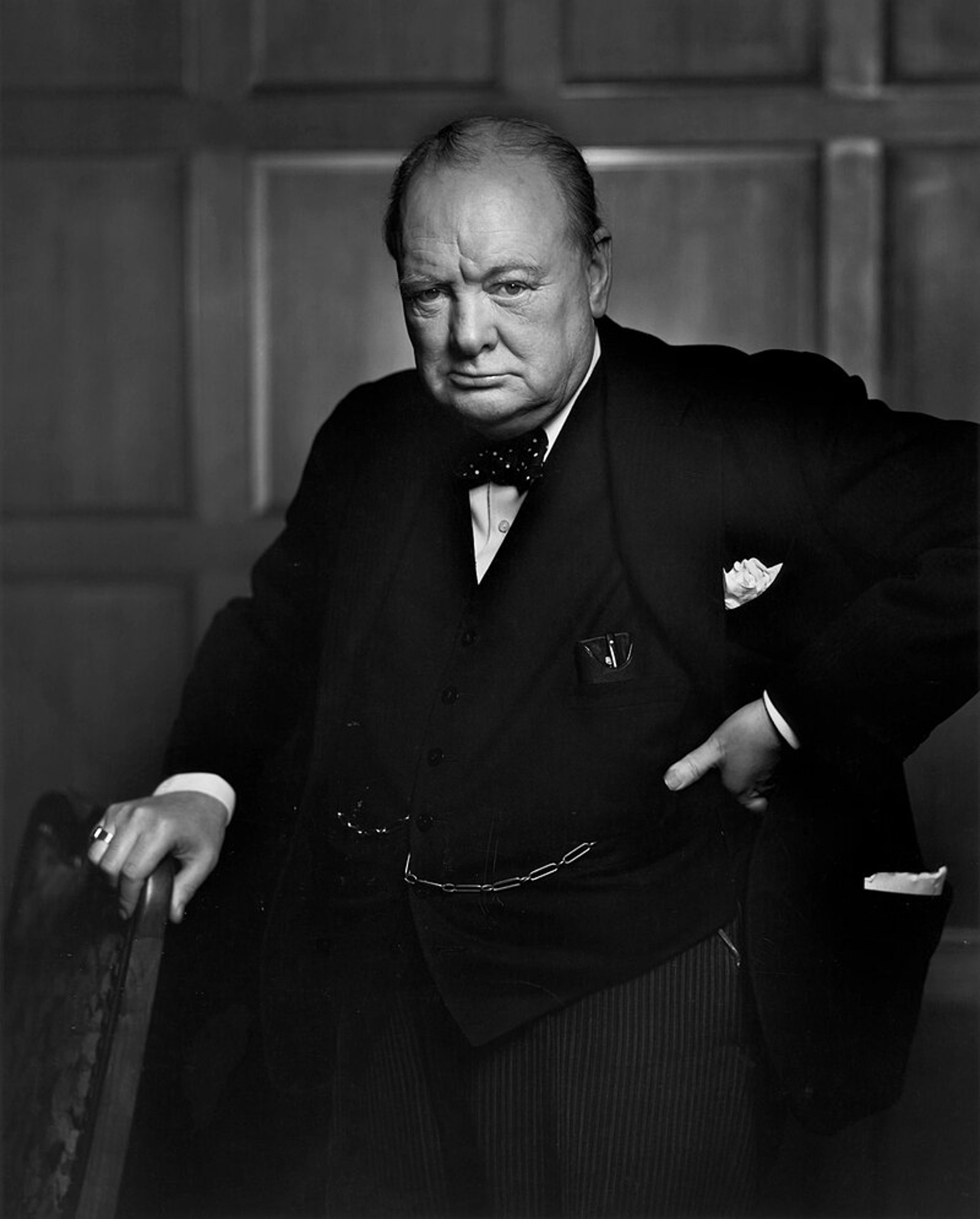
You didn’t come this far to stop
Churchill's Strategic Misstep:
The Flawed Defense of Singapore and Malaya
Descent into Hell, Episode 8: Churchill's Strategic Misstep
A Leadership Miscalculation In the context of World War II, Winston Churchill is revered as a symbol of unyielding leadership. However, his decisions regarding the defense of Singapore and Malaya reveal a stark strategic error that had catastrophic consequences. This episode delves into Churchill's misplaced reliance on naval power and his underestimation of Japanese military capabilities, leading to one of the most significant military failures in British history.
WW2 HISTORYDESCENT INTO HELLIN THEIR FOOTSTEPS BLOG
Toursofwar.com
7/21/20249 min read
Churchill’s Overconfidence in Naval Power
In August 1940, Winston Churchill conveyed his confidence that Japan would not act aggressively unless Germany successfully invaded Britain. This miscalculation would prove disastrous for the British defense of Singapore and Malaya. Churchill’s reliance on naval power, rather than a balanced defense strategy that included strong land-based forces, reflected a significant disconnect between his strategic planning and the on-the-ground realities of Southeast Asia.


The September 1940 Cable: A Dangerous Miscalculation
Churchill’s Flawed Defense Plan
In a signal to General Ismay on September 10, 1940, Churchill reiterated his belief that the Royal Navy was the cornerstone of Singapore’s defense, even in the event of a Japanese siege. He asserted that a superior fleet could relieve Singapore regardless of the situation on the ground in Malaya, a notion that proved to be dangerously naive.
Churchill’s Assertion: Churchill claimed that the mere presence of the Royal Navy, even if not directly in Singapore, would be sufficient to deter Japanese aggression.
Underestimating the Japanese Strategy: Churchill failed to appreciate the effectiveness of the Japanese strategy, which emphasized rapid land assaults over naval engagements.
Neglect of Ground Realities: Churchill’s dismissal of the need to defend the Malaya Peninsula contradicted the assessments of his military advisors, who recognized the critical importance of securing Malaya to protect Singapore.
Misplaced Faith in the Royal Navy
Overreliance on Naval Power: Churchill's focus remained on the Royal Navy as the primary defender of Singapore, neglecting the need for a robust ground defense in Malaya.
Underestimation of Japanese Capabilities: Churchill believed that Japan would be deterred by the presence of the U.S. Pacific Fleet and would not risk engaging Britain, a grave miscalculation that ignored Japanese military ambitions.
Impact on Defense Planning: This strategic misjudgment led to insufficient preparation and resource allocation for the defense of Malaya, leaving British forces vulnerable to Japanese advances.
Did You Know? Churchill’s Misjudgment of Japan’s Intentions
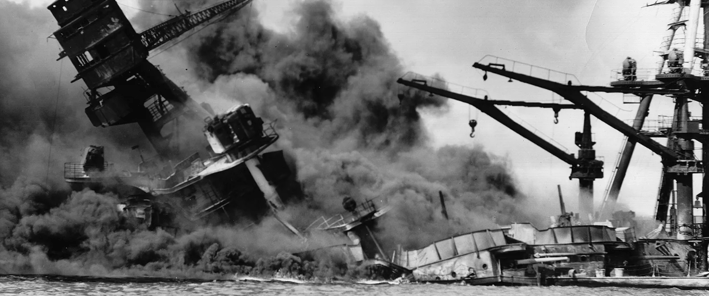

In his September 1940 cable, Churchill stated that the Japanese were "not at all likely to gamble" on a war with Britain. This gross underestimation was proven disastrously incorrect when Japan launched simultaneous attacks on Pearl Harbor and British territories in Southeast Asia just over a year later.
The British Chiefs of Staff and military leaders in Singapore recognized that the defense of Malaya was crucial for Singapore’s survival. Extensive military exercises and assessments highlighted the need for robust ground defenses, a view that was starkly at odds with Churchill’s belief in the sufficiency of naval power alone.


Churchill vs. the Chiefs of Staff
Diverging Views on Defense Strategy
Chiefs of Staff's Perspective: They argued that without defending Malaya, Singapore would be vulnerable to Japanese attacks, a view supported by extensive military planning and simulations.
Churchill’s Contradiction: Despite clear warnings, Churchill maintained his stance that the Royal Navy was sufficient for Singapore’s defense, ignoring the need for strong land forces.
Impact on Military Strategy: This strategic disconnect led to inadequate preparations in Malaya, leaving the region exposed to the swift and devastating Japanese invasion.
Did You Know? Churchill’s Dismissal of Ground Defense Needs
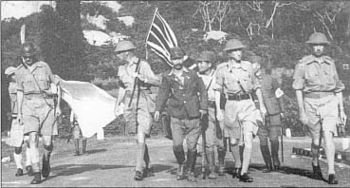

Despite numerous warnings from his military advisors, Churchill insisted that defending the Malaya Peninsula was unnecessary. His reliance on naval power, coupled with a dismissal of the need for ground defenses, played a pivotal role in the rapid fall of both Malaya and Singapore to Japanese forces.
The fall of Singapore was not merely the result of Japanese military prowess; it was also a consequence of a series of miscalculations and ignored warnings from experienced military leaders. Churchill’s insistence on prioritizing naval power over a comprehensive defense strategy for Malaya reflected a significant disconnect between political leadership and military expertise.
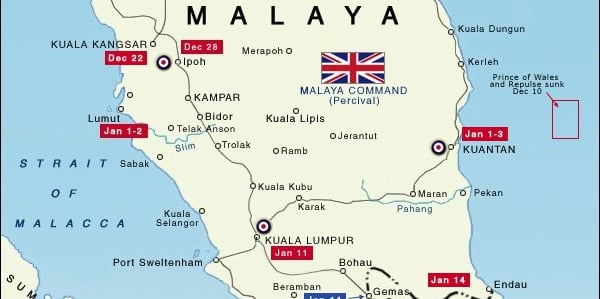

The Flawed Defense of Singapore
Ignoring the Warnings of Military Advisors
Ignored Warnings: Military advisors repeatedly emphasized the importance of defending Malaya to protect Singapore, but their concerns were overshadowed by Churchill's confidence in naval superiority.
Lack of Preparedness: The failure to reinforce ground defenses in Malaya left British forces unprepared for the rapid and overwhelming Japanese advance.
Outcome: This oversight allowed the Japanese to bypass naval defenses, advancing through Malaya and isolating Singapore, leading to its eventual surrender.
While Churchill remained confident in the Royal Navy’s ability to deter Japanese aggression, the Japanese military executed a well-coordinated and rapid advance through Malaya, exploiting the very weaknesses that had been highlighted by British military advisors. The Japanese land campaign was characterized by its speed, efficiency, and ability to bypass British defenses, ultimately isolating Singapore.
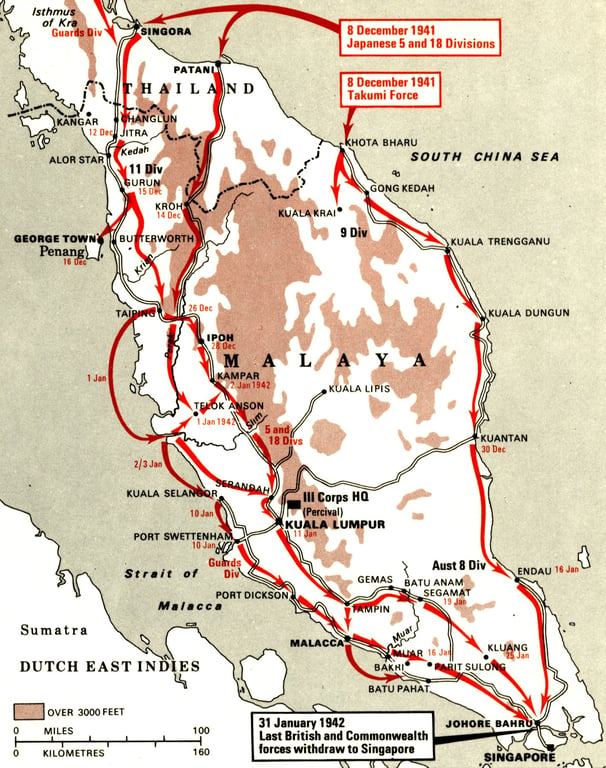

The Japanese Advance Through Malaya
The Reality on the Ground
Japanese Military Strategy: The Japanese forces prioritized speed and mobility, moving through the dense jungles of Malaya and outflanking British defensive positions.
British Vulnerabilities: The lack of sufficient ground forces in Malaya, coupled with inadequate fortifications, left British troops ill-prepared to halt the Japanese advance.
Isolation of Singapore: By the time Japanese forces reached Singapore, the city was effectively cut off, with little hope of reinforcement or resupply, leading to its eventual surrender.
Did You Know?
The Impact of Churchill’s Miscalculations
Churchill’s confidence that Japan would avoid conflict unless Germany succeeded in invading Britain was a critical error in judgment. This assumption led to a lack of preparation and reinforcement for British forces in Southeast Asia, culminating in the catastrophic loss of Singapore.
During the critical period from 1922 to 1940, the British government’s approach to the defense of Singapore was marked by significant inconsistency and discord. This is best illustrated by Clifford King’s observation in his biography of General Percival, which highlights a profound misalignment in strategic thinking. King’s remark that the Prime Minister and the Chiefs of Staff were signing from “different hymn sheets” underscores the stark contrast between Churchill’s strategic vision and the military reality on the ground.
King’s choice of words points to a broader issue of strategic disunity. The Prime Minister and his military advisors were not merely out of sync; they were, in King’s view, engaged in a cacophony of competing priorities and misguided strategies. The lack of a cohesive strategy became glaringly apparent as the Japanese forces advanced. Despite warnings and assessments indicating that if Japan gained a foothold on the Malay Peninsula, Singapore's defense would be severely compromised within two months, Churchill’s plans remained disconnected from the urgent realities faced by the defenders.
The British government had held divergent views on Singapore's defense throughout the 1920s and 1930s. This lack of consistent policy and strategic foresight contributed significantly to the mismanagement of the defense against Japanese aggression.
The “Different Hymn Sheets”
Divergent Strategies
Key Points:
Clifford King’s observation about the “different hymn sheets” reflects a deeper strategic misalignment between Churchill and his military advisors.
The disconnect between British strategic planning and the operational realities in Singapore became increasingly apparent as the Japanese threat escalated.
Divergent views on defense strategy during the 1920s and 1930s led to inconsistent and ineffective defense planning.
The fall of Singapore was not merely the result of Japanese military prowess; it was also a consequence of a series of miscalculations and ignored warnings from experienced military leaders. Churchill’s insistence on prioritizing naval power over a comprehensive defense strategy for Malaya reflected a significant disconnect between political leadership and military expertise.
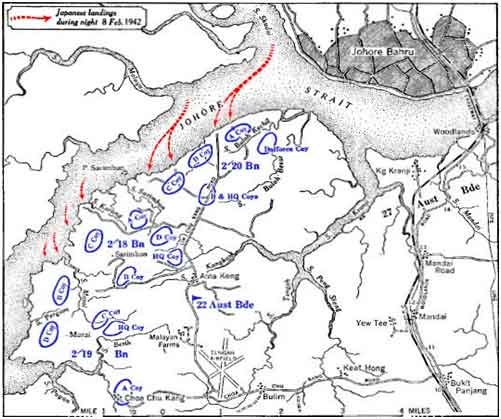

The Consequences of Dismissing Expertise
Warnings Unheeded
Dismissal of Military Expertise: Churchill ignored assessments that highlighted the critical need for defending Malaya, which was essential for the protection of Singapore.
Flawed Strategic Assumptions: His assumption that the Royal Navy would remain a viable defense mechanism, even if Japanese forces had already made significant land gains, demonstrated a disconnect from the realities of modern warfare.
Outcome: The failure to heed these warnings directly contributed to the swift Japanese advance through Malaya and the subsequent fall of Singapore, one of the most significant British military defeats of World War II.
As the strategic shortcomings in Britain's defense of Singapore became evident, the focus shifted from an overreliance on naval power to a more balanced approach that included ground troops. Despite the Royal Navy's emphasis, the inability to effectively defend Singapore revealed the need for additional military support.
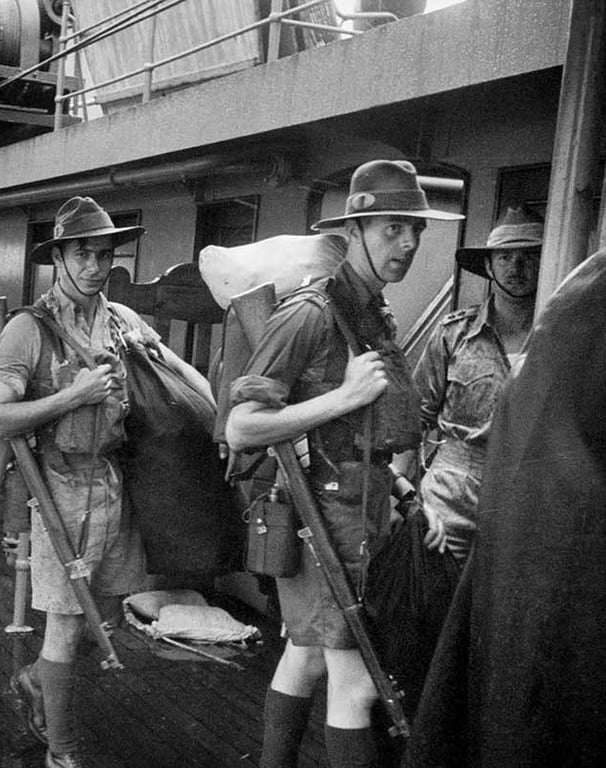

The Shift from Naval Power to Ground Troops
Australian Reinforcements
As the emphasis of the defense strategy shifted to the Royal Air Force (RAF), the limitations of relying solely on naval power became apparent. Churchill's focus on the Royal Navy's role in defending Singapore was increasingly seen as insufficient, leading to calls for additional support. During this period, the Australian government was approached to contribute more forces to the defense of Singapore and Malaya.
Inadequate Defense Strategy: The shift from naval to air power did not adequately address the ground-based threats posed by Japanese forces. The Royal Navy, despite its strength, was not enough to secure Singapore without sufficient ground and air support.
Calls for Australian Support: Faced with mounting pressures and the realization of inadequate defense resources, the British government sought assistance from Australia. The Australian government was asked to provide additional divisions to bolster the defense of Singapore and Malaya.
Raising the AIF: The Australian Imperial Force (AIF) was mobilized and prepared for service in the critical theater of Singapore and Malaya. This move was a crucial step in addressing the shortfall in defensive capabilities, though it came too late to prevent the eventual Japanese advance.
Key Points:
The Australian government was asked to contribute reinforcements, leading to the mobilization of the AIF for service in Singapore and Malaya.
The inclusion of Australian forces was a critical response to the strategic challenges faced by the British and marked a significant step in strengthening the defense against Japanese aggression.
Conclusion
Churchill's strategic missteps and the resulting flawed defense of Singapore and Malaya highlight a critical period of misjudgment and disarray in British military planning. The divergence between Churchill's vision and the harsh realities faced by the defenders was stark, revealing a fundamental disconnect in addressing the Japanese threat effectively. The acknowledgment of the limitations of relying solely on naval power, coupled with the strategic blunders regarding the defense of Singapore, exposed the urgent need for a more comprehensive approach.
As the situation deteriorated, the focus of the defense strategy began to shift. The realization that the Royal Navy alone could not hold back the Japanese advance prompted a crucial change. The British government’s decision to request Australian reinforcements underscored the necessity of a more integrated defense effort, combining naval, air, and ground forces. This move was pivotal in addressing the strategic gaps and preparing for the intense combat that lay ahead.
With this shift, our story now transitions to the Australian aspect of the defense effort. The mobilization of Australian forces and their role in fortifying the defense of Singapore and Malaya will be explored in detail. Their involvement marked a significant chapter in the broader narrative of World War II, showcasing the collaborative efforts required to meet the formidable challenges posed by Japanese aggression. The subsequent focus will delve into the raising and leadership of the Australian Imperial Force (AIF) and their critical contributions to the defense of this crucial theater.
How You Can Help
Donations and Sponsorships: We are seeking corporate sponsorships and donations to fund ongoing restoration projects and educational programs. Your support can make a significant difference in maintaining the quality and impact of the museum.
Volunteer Opportunities: If you have expertise or time to offer, consider volunteering with us. There are many ways to get involved, from artifact restoration to educational outreach.
Spreading the Word: Share this blog and our mission with your network. The more people who know about the JEATH War Museum and its significance, the greater the impact we can achieve together.
The St Andrews Research Team is dedicated to preserving the legacy of the Thai-Burma Railway and the memories of those who suffered. We need your support to continue our work. There are several ways you can help:
Join the Cause!
If you or someone you know is interested in supporting this cause, please get in touch.
This is a chance to be part of something truly meaningful and impactful.



Together, We Can Make a Difference!
This is a veteran-run project, and we need your help to make it happen. Stand with us in honoring the legacy of the POWs and ensuring their stories are never forgotten.
